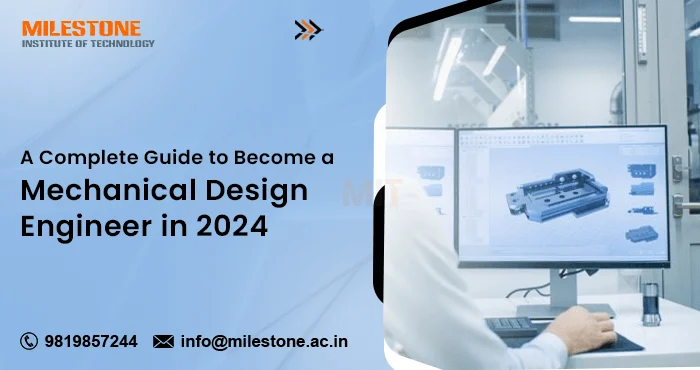Mechanical design is a fundamental aspect of the dynamic field of engineering that accelerates innovation in various industries. Mechanical design engineers are essential to the ideation, creation, and execution of many systems and products. This in-depth guide will lead you through the steps needed to become a
Mechanical Design Engineer in 2024 if you want to start this exciting adventure of using mechanical design to shape the future.
Who is a Mechanical Design Engineer?
Let’s understand who is a mechanical design engineer before getting into deep details. The primary responsibilities of a mechanical design engineer is to create complete designs for products, mechanical systems, or components. These designs cover many different types of industries and businesses, including aerospace, automotive, manufacturing, and consumer electronics which can also include complex machinery as well as consumer products.
Understanding the Role of a Mechanical Design Engineer
The role of a Mechanical Design Engineer is multi-faceted, involving various stages of the design process. From conceptualization to prototyping and eventual production, these engineers are involved in every step to ensure the functionality, efficiency, and safety of the final product. They work closely with cross-functional teams, including industrial designers, manufacturing engineers, and product managers, to bring designs from conception to reality.
Understanding the Responsibilities of a Mechanical Design Engineer
The responsibilities of a Mechanical Design Engineer can vary depending on the industry and specific project requirements. However, some common responsibilities include:
- Conducting research to understand project requirements and constraints.
- Creating detailed design specifications and technical drawings using CAD software.
- Performing feasibility studies and analysis to ensure the viability and performance of designs.
- Collaborating with other engineers and professionals to integrate mechanical components into larger systems.
- Testing prototypes and conducting thorough evaluations to identify and address any design flaws or performance issues.
- Optimizing designs for cost-effectiveness, manufacturability, and efficiency.
- Staying updated with industry trends, technological advancements, and best practices in mechanical design.
Education and Qualification for Mechanical Design Engineer
To start a career as a mechanical design engineer you should have a bachelor’s degree in
mechanical engineering or in a related field. However, for advanced roles or specialized industries some employers mainly prefer candidates with a master’s degree.
In advance you can also acquire relevant certifications and participate in continuous learning opportunities which will help you to enhance your qualifications and marketability in the field.
Key Skills Required to Become a Mechanical Design Engineer
To excel as a Mechanical Design Engineer, you need a combination of technical expertise and soft skills. Let’s break down the essential skills required for success in this role:
Technical Skills:
- AutoCAD Design: Proficiency in CAD software, such as AutoCAD, is essential for creating detailed 2D and 3D models.
- Mechanical Design and Optimization: Strong knowledge of mechanical principles and techniques for designing and optimizing mechanical systems.
- Product Research and Design: Ability to conduct thorough research and apply design principles to develop innovative products that meet user needs.
- Electronics Engineering and Research: Understanding of electronics principles and integration with mechanical systems, especially in fields like mechatronics and robotics.
- CAD Design (PTC Creo): Familiarity with advanced CAD software like PTC Creo for complex design projects.
Soft Skills:
- Problem-Solving: A knack for identifying and resolving complex engineering challenges efficiently.
- Communication: Effective communication skills to collaborate with cross-functional teams and convey technical information to non-technical stakeholders.
- Creativity: Ability to think creatively and innovate while adhering to design constraints and requirements.
- Attention to Detail: Meticulous attention to detail to ensure accuracy and precision in design work.
- Time Management: Strong organizational skills to manage multiple projects and meet deadlines effectively.
Minimum Skills Required
While the aforementioned skills are essential for success, certain minimum skills are required to enter the field as a Mechanical Design Engineer. These include:
- Proficiency in CAD software (e.g., AutoCAD, SolidWorks, CATIA).
- Basic understanding of mechanical engineering principles and concepts.
- Ability to interpret technical drawings and schematics.
- Strong mathematical and analytical skills.
- Willingness to learn and adjust to new techniques and technologies.
Pursuing Professional Certifications
Obtaining relevant certifications can bolster your credentials and demonstrate your expertise to potential employers. Some notable certifications for Mechanical Design Engineers include:
- Certified SolidWorks Professional (CSWP)
- Autodesk Certified Professional (ACP) in AutoCAD
- Certified Mechanical Design Engineer (CMDE)
These certifications not only validate your skills but also provide opportunities for career advancement and specialization within the field.
Join Institute or Training Center
Joining a training center or institutes will help you in your career growth and empower your skills.
Milestone Institute of Technology offers practical training, expert guidance, placements and certification. Take the first step towards a successful career.
Career Hierarchy
As you progress in your career as a Mechanical Design Engineer, you may have the opportunity to advance into higher-level roles within the field. Some common career paths and hierarchy in mechanical design engineering include:
- Manufacturing Engineering Manager: Responsible for overseeing manufacturing processes and optimizing production efficiency.
- Senior Director Of Engineering: Provides strategic leadership and direction for engineering teams and projects.
- Mechanical Engineering Manager: Manages a team of mechanical engineers and oversees the design and development of mechanical systems.
- Process Engineering Manager: Focuses on improving manufacturing processes and implementing continuous improvement initiatives.
- Product Engineering Manager: Leads the development and launch of new products, from concept to production.
Each of these roles offers unique challenges and opportunities for growth, allowing you to advance your career and make a significant impact in the field of mechanical design engineering.
Conclusion
In conclusion, if you want to become a mechanical design engineer you should focus on technical expertise, creativity, and continuous learning. By taking the necessary education, skills, techniques and certifications you can boost your rewarding career journey which will offer you opportunities for collaboration, innovation, and professional growth. Even if you are passionate about automotive design, aerospace engineering or consumer electronics the field of mechanical design engineering holds endless possibilities for those who are willing to explore this field and want to push their boundaries of innovation in 2024 and beyond.




